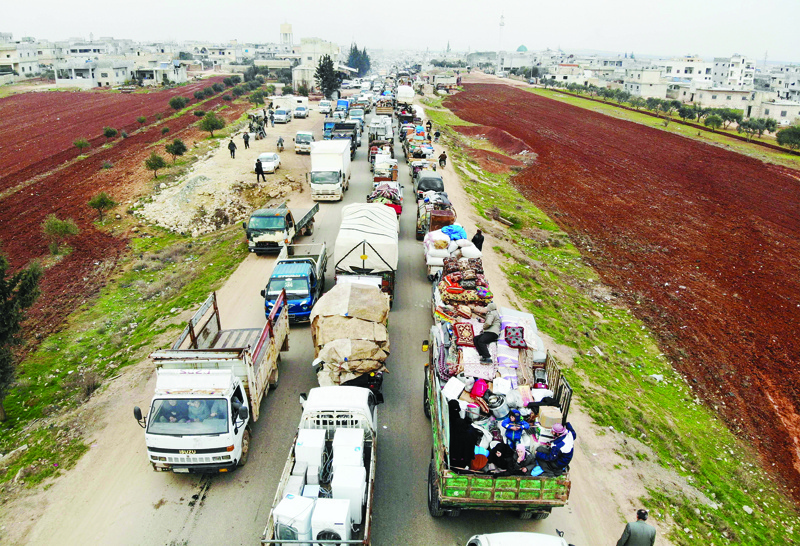
BEIRUT: Regime forces yesterday recaptured most of Maaret Al-Numan, a semi-deserted town of symbolic and strategic importance in Syria's last major rebel-held bastion, state media and a war monitor said. "The Syrian army has retaken most neighborhoods in Maaret Al-Numan" and are now combing recaptured areas, said state news agency SANA, shortly after Damascus loyalists entered the town in the northwest province of Idlib for the first time in eight years.
The Britain-based Syrian Observatory for Human Rights said that most rebels and jihadists had pulled out after regime forces stormed the town from multiple fronts earlier in the day. It said regime forces were left battling the few fighters that remained holed-up in the area, which has been under opposition control since 2012. Maaret Al-Numan, which is nearly deserted after months of bombardment, lies on the M5 highway linking Damascus to Syria's second city Aleppo, a main artery coveted by the regime as it tries to rekindle a moribund economy.
It is also the second biggest urban center in the beleaguered opposition bastion of Idlib. Its recapture would bring the regime a step closer to taking full control of the wider jihadist-run bastion and the M5 highway that runs through it. Damascus loyalists have since Friday seized more than 25 towns and villages around Maaret Al-Numan, the Observatory said. The regime's advance is part of a multi-pronged push in northwest Syria, dominated by jihadists of the Hayat Tahrir al-Sham alliance and their rebel allies. The violence has displaced around 358,000 people in Syria's northwest since December, the United Nations says.
Exodus
In areas north of Maaret Al-Numan, bombardment by regime ally Russia has prompted a fresh wave of displacement in recent days, with hundreds of vehicles packing a key exit route towards areas near the border with Turkey, according to the Observatory and AFP correspondents. Most were fleeing the town of Saraqib and the Jabal Al-Zawiya region, both located north of Maaret Al-Numan. Russia has bombed areas around the main exit routes, despite the heavy outflow of civilians, according to the Observatory.
Misty Buswell of the International Rescue Committee warned that the latest escalation "will only add to the humanitarian catastrophe that is already unfolding". The escalation has also sparked concern from rebel-supporter Turkey which operates 12 observation posts in Idlib under a Sept 2018 deal with Russia that aimed to prevent an onslaught in the province.
Turkey warned yesterday it will retaliate "in self-defense" if any of its army posts are threatened, while accusing the regime of "massacring innocent civilians and causing a humanitarian tragedy". The Observatory says regime troops have encircled a Turkish observation post south of Maarat Al-Numan as part as their push towards the town. It is the third such post encircled by regime forces in the region.
'Town of the revolution'
The Idlib region is home to three million people, half of whom have already been displaced from other parts of the country. Maaret Al-Numan was one of the first in that region to rise up against the government of President Bashar Al-Assad in 2011, its residents say. Dubbed "the town of the revolution", it became a hub for demonstrations in the southern part of Idlib, attracting followers from villages all around.
Rebels overran the town in Oct 2012, attracting deadly regime air strikes on the town but without dousing the revolutionary fervor. The latest push to retake Maarat Al-Numan coincides with battles between regime forces and jihadists in the west of Aleppo province, a rebel-held area that in mid-January became the latest front of fighting in northwest Syria. The battles there are the most intense since regime forces forced rebels out of large swaths of the province in 2016.
Regime forces, which currently control around 70 percent of Syria, have repeatedly vowed to recapture the entire country, including Idlib and its environs. Syria's war has killed more than 380,000 people and displaced more than half the country's population since starting in 2011 with the brutal repression of anti-government protests. - AFP









